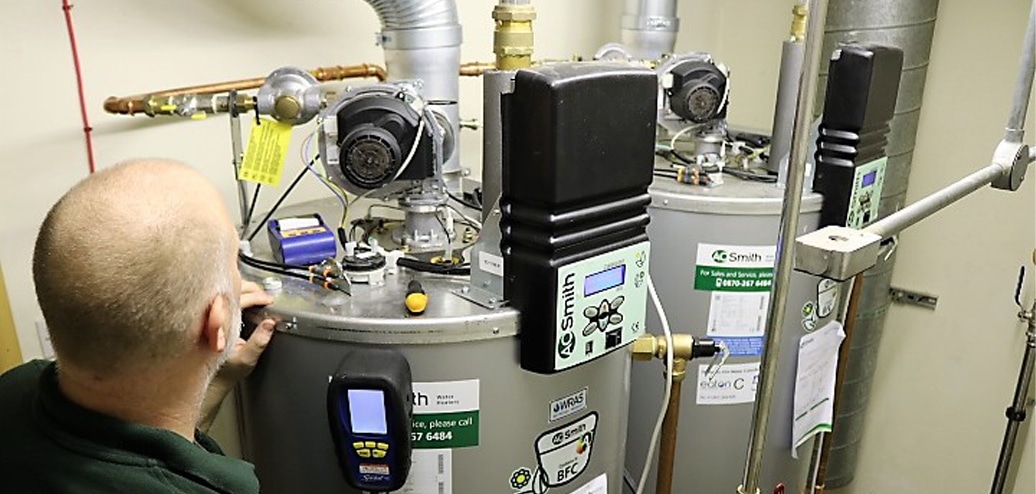Keeping hot water flowing is critical in the commercial sector, where domestic hot water (DHW) appliances will be subjected to extremely hostile conditions, with high temperatures, thermal stress and flue gas condensate on the combustion side and oxygen, minerals and chemical attacks leading to potential corrosion on the waterside. Given this harsh daily treatment, regular servicing and maintenance are key if business-critical service is to be observed. Ensuring consistent operations and prolonging the life of a commercial hot water and heating system should therefore be a key factor when specifying and costing out these business-critical systems.
Once an application is sized correctly and installed, that maintenance process begins with commissioning. This choice falls to the customer, but Adveco advises that it should be engaged to commission its own appliances. This ensures product warranty commences from the date of commissioning, rather than the date of delivery which may be months before a system eventually goes live. If not commissioned by Adveco, it will also fall to the customer to fault find, order the new part and return the faulty part, which can be a painful, time-consuming process for any facility manager who is already time-poor.
Keeping hot water flowing to support consistent operations, we specialise in both commissioning and proactive warranty service to the manufacturer’s recommendations. This is crucial for the consistent and efficient operation of an appliance which can be affected by a range of environmental factors, water condition most notably, but air quality can also harm operation. The UK is broadly split between hard and soft water conditions. In naturally soft water conditions, despite the use of sacrificial anodes, glass-lined vessels can rapidly succumb to critical corrosive damage, making stainless steel the optimal choice, with longevity countering higher purchase costs. Commercial glass-lined steel water heaters and tanks are usually the more cost-attractive proposition in the UK, especially in harder water areas, where, given the right conditions, they are generally resistant to attack from most chemicals and less-corrosive materials. However, the deposition of calcium carbonate, or scale, found in harder water remains a key issue, whether opting for glass-lined or stainless steel vessels.
The latest generation of water heaters may incorporate recirculation pumps to balance the flow of water through the appliance’s heat exchanger. That balance is critical as higher flows can reduce calcification, but it can also lead to corrosion where that flow is interrupted or broken. This is why internal forms should default to curves within the design to provide consistent, unbroken flows.
In typical operation in harder waters, in our experience, it is almost impossible to completely avoid the build-up of scale. Magnets simply do not work properly, so the use of an inhibitor fluid is critical alongside regular annual servicing. This can be of a representative number of appliances on a premise, with conditions that reduce or extend that service period. Low levels of scale may allow for units to be serviced in alternate years for example reducing costs. That annual service must however be thorough.
Too many times an ‘annual service’ will be a quick test with an analyser and issue of a landlord’s certificate. Such activity is relatively low cost, as it avoids the purchase of a service kit, but is ultimately a false economy. It will miss the early onset of calcification and means the water heater or boiler is more likely to suffer early, terminal blockage. For a thorough annual service, we would advocate appliances be fully drained, visually examined and any scale be removed. The process involves disassembly which requires the replacement of rubbers and gaskets, hence the requirement to purchase a service kit. Though more costly, such full services are substantially cheaper than the cost of replacing blocked heat exchangers, burners and even the entire appliance.
If scale build-up is not addressed, then within five years any descaler fluid introduced will simply wash over the surface, which will also easily resist the most concerted of hammer blows. At this stage, the descaler will also not pass through the heat exchanger, requiring its complete replacement. This is seen when servicing or preventative maintenance has been avoided or forgotten, at which point the manufacturer’s warranty will be void.
Annual monitoring of the inhibitor system used for boilers is also key, especially if heating facilities have been refurbished within a building. It is not uncommon to see boilers damaged after radiators are replaced, and new water introduced into the system without replacing lost inhibitor fluid. Monitoring and replacement as part of the annual service activity will again protect the heat exchangers.
The other key failure point is the burner in gas-fired appliances. Condensing boilers and water heaters will draw air from the plant room and if that is dusty, it will be sucked in, reducing the efficiency. If not cleaned regularly, the burner will soot up and eventually become blocked often requiring full replacement at some cost. Even if located in an open space, or exterior to the building the burner should be thoroughly inspected. Nearby building works can cause high levels of dust, and in dense urban areas, pollutants from vehicles can also be drawn into the appliance causing build-up of dirt on the burner.
Serviced thoroughly and regularly, commercial water heaters and boilers should have an efficient operational lifespan of at least ten years (depending on location), and we do see appliances still operating for twice that length of time. The caveat in these cases though is that the overall efficiency of legacy units operating for more than 10 years will be far lower than current generations of appliances and will almost certainly fail to meet current ERP regulations on emissions introduced in 2018 for new water heaters and boilers. So continued maintenance of such units would not only be a false economy in terms of running costs but will certainly not be contributing to any efforts to introduce better sustainability in a building.
In short, failure to descale, flush sediment, clean burners, check anodes or test for corrosion will reduce the operational longevity of any appliance, but also severely impact the efficient operation. That has negative implications on operational costs and unwarranted capital implications if there is a catastrophic failure. Under such conditions, this will almost certainly invalidate any manufacturer warranty that exists. Reactive service providers will only check gas pressures and overall condition, they will then wait for breakdowns and call outs. Only by keeping hot water flowing through proactive servicing can you ensure any costly downtime of business-critical hot water is absolutely minimised.
Keeping hot water flowing. Visit our warranty service page or contact us to arrange for your service.
















